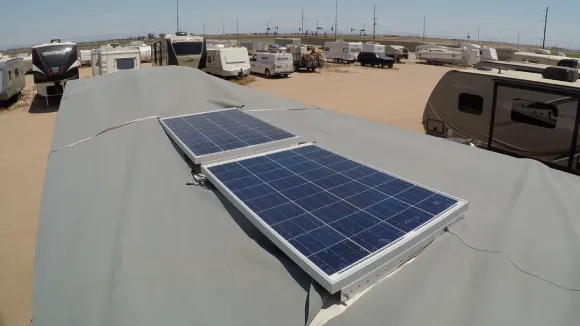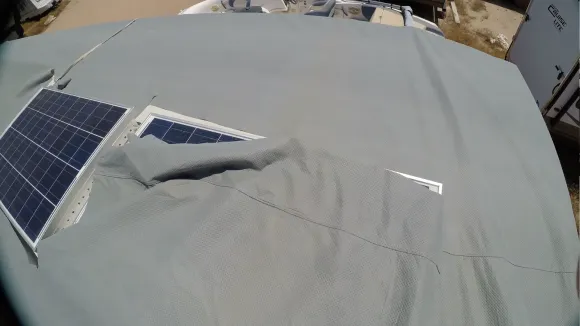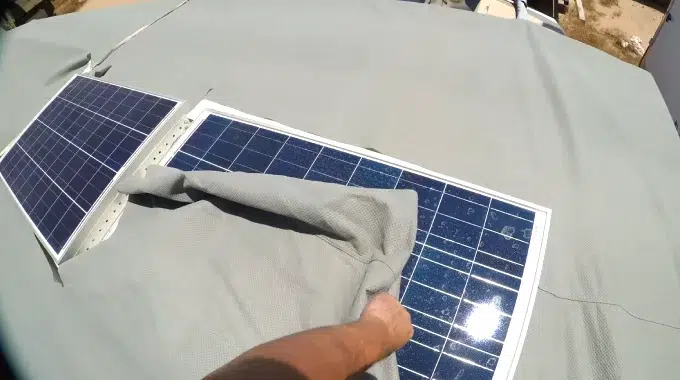Last Updated on September 25, 2023
Solar panels have revolutionized the way we harness energy, providing an eco-friendly and efficient way to power RVs. But here’s a question that you may have: Can solar panels work effectively when installed under an RV cover?
If directly exposed to the sun, solar panels can generate their full power capacity. But if they’re hidden under an RV cover or roof, their efficiency depends on several factors, including the type and design of the cover and the weather.
Here, we will explore the factors contributing to the effectiveness of solar panels under an RV cover and address any concerns you may have.
Do Solar Panels Work Under an RV Cover: Know the Factors

When considering whether solar panels will work under an RV cover, several key factors must be considered. Here are the primary ones:
- Orientation and sun exposure
- Panel tilt angle
- Material and transparency
- Ventilation and heat buildup
- Snow and debris accumulation
- Maintenance accessibility
- Weight and structural integrity
- Wind resistance
- Installation compatibility
- Aesthetics and additional accessories
Let’s take a closer look at each of these factors to determine how they affect the performance of solar panels under an RV cover.
No 01. Orientation and Sun Exposure
If you position your RV cover in a way that blocks direct sunlight, your solar panels won’t be able to efficiently harness solar energy. The orientation and sun exposure of your RV cover are crucial factors determining your solar panels’ effectiveness.
For optimal performance, you should position your RV cover to allow maximum sunlight exposure to your panels. By ensuring that your panels receive direct sunlight, you can maximize their energy production and efficiency.
Orienting your RV cover in a manner that allows the panels to face the sun directly, preferably at a 30-degree angle, is recommended. This way, the panels can capture the most sunlight and convert it into usable energy for your RV’s electrical needs.
No 02. Panel Tilt Angle
Some RV covers may limit the optimal tilt angle of solar panels, potentially hindering their ability to capture maximum sunlight. Achieving the ideal tilt angle is crucial to ensure efficient solar panel operation. Adjusting the tilt angle can optimize the panels’ exposure to sunlight throughout the day.
However, certain RV covers may restrict the ability to make these adjustments, limiting the panels’ effectiveness. It is important to consider this factor when choosing an RV cover for your solar panel installation. To maximize energy production, you should ensure that the cover allows for easy tilt angle adjustment.
No 03. Material and Transparency
For protecting your RV and maximizing the efficiency of your solar panels, the material and transparency of the cover play a crucial role.
A translucent or semi-transparent cover allows a certain amount of sunlight to pass through, which is essential for properly functioning your solar panels. This way, your panels can absorb the sun’s energy and use it to power your RV.
On the other hand, opaque covers block sunlight entirely, rendering your solar panels ineffective. Therefore, selecting a cover that strikes the right balance between protection and transparency is important, ensuring that your solar panels can operate optimally.
No 04. Ventilation and Heat Buildup
Excessive heat can significantly impact the performance of your solar panels. When an RV cover limits ventilation, it creates a greenhouse effect, trapping heat underneath. This can cause the panels to operate at lower efficiency levels due to increased operating temperatures.
Adequate ventilation is crucial for dissipating heat and preventing heat buildup. Make sure that there are sufficient openings or vents in your RV cover to allow for proper airflow. Additionally, consider using covers made from breathable materials that promote air circulation.
No 05. Snow and Debris Accumulation
If the cover doesn’t allow for shedding, it might hinder the performance of solar panels by causing the buildup of snow, leaves, or other debris.
When snow or debris accumulates on the surface of the solar panels, it creates a barrier that prevents sunlight from reaching the panels effectively. This reduces the amount of solar energy that can be converted into electricity, thus decreasing the overall performance of the solar panels.
Additionally, the weight of the accumulated snow or debris can potentially damage the panels or the RV roof. Therefore, choosing a cover designed to allow for the shedding of snow and debris is crucial.
No 06. Maintenance Accessibility
It is crucial to have easy access to your solar panels for regular cleaning and inspections. If the RV cover hinders your ability to perform maintenance tasks, it can hurt the performance and efficiency of your panels.
Accumulated dirt and grime can reduce the amount of sunlight reaching the panels, resulting in lower energy production. Therefore, choosing an RV cover that allows easy access to the solar panels is important.
This will ensure you can properly maintain and clean your panels, maximizing their efficiency and lifespan.
No 07. Weight and Structural Integrity
When choosing an RV cover, make sure it doesn’t strain your RV’s structure excessively due to its weight. The weight of the cover, especially when it accumulates snow or water, can significantly impact the structural integrity of your RV.
This is particularly important if your RV is equipped with solar panels. The added weight of the cover can potentially misalign the panels and affect their ability to capture energy efficiently. The mounting points of the panels could be compromised, leading to a decrease in their performance.
To ensure that your solar panels continue to work effectively under an RV cover, it is crucial to select a cover that is lightweight and does not exert unnecessary pressure on your RV’s structure.
No 08. Wind Resistance
When RV covers flap in the wind, they create a constant pressure and release cycle, leading to stress on the panels and their connections. This repetitive motion can weaken the structural integrity of the panels and potentially cause them to malfunction.
To prevent this, selecting a cover specifically designed to resist high winds is important. Look for covers that have reinforced straps or buckles to fasten the cover in place securely. Additionally, consider covers made from durable materials resistant to tearing or ripping in strong winds.
No 09. Installation Compatibility
When installing solar panels on your RV, it is crucial to consider the compatibility between the panels and the cover. The framework of the cover should be designed in a way that allows for easy and unobstructed installation of the panels. Any interference can affect the efficiency and effectiveness of the solar system.
Ensure that the cover does not block the panels from receiving direct sunlight, as this is essential for their operation. Additionally, make sure that the cover’s framework does not hinder the wiring connections of the panels.
Proper installation compatibility will ensure that your solar panels work optimally, providing you with the desired energy efficiency for your RV.
No 10. Aesthetics and Additional Accessories
To enhance the appearance of your RV, you can consider adding accessories and choosing covers with intricate designs. These additions can make your RV stand out and reflect your personal style.
However, when selecting these accessories, it is crucial to consider your solar panels’ functionality. While aesthetic covers and accessories may look appealing, they should not obstruct or compromise the performance of the solar panels.
Which Dehumidifier for RV is Best for Using Under an RV Cover?
When looking for the best rv dehumidifiers 2021 to use under an RV cover, it’s important to consider their size, energy efficiency, and moisture removal capabilities. Opt for a dehumidifier with a compact design to fit in limited spaces, high energy efficiency for extended use, and sufficient moisture removal abilities to prevent mold and mildew growth. Investing in the right dehumidifier can help keep your RV dry and odor-free, even when it’s protected under a cover.
Should I cover the RV with solar panels?

While it may seem like a logical solution to protect your RV solar panels from severe weather, covering them can render them ineffective.
Solar panels need direct sunlight to generate electricity; covering them would prevent this. Most solar panels are designed to withstand wind and rain, but hail can pose a significant threat.
It’s important to balance protecting your panels and ensuring they can still function optimally. If you’re concerned about hail damage, alternative options are available, such as installing hail guards or using flexible solar panels that are more resistant to impact.
Are There RV Covers Specifically Designed for Solar-Equipped RVs?
While there aren’t covers exclusively made for solar-equipped RVs, you can find options prioritizing ventilation and customization for your setup.
It’s important to consider the specific needs of your solar panel system when choosing an RV cover. Look for covers that offer adequate ventilation to prevent heat buildup, as excessive heat can affect the efficiency of your panels.
Additionally, customization options are crucial to ensure that the cover fits properly over your RV and solar panels without any obstructions.
Harness RV Solar Power While Parked Under Cover
While using solar panels under an RV cover presents challenges, generating a substantial amount of energy with the right approach is still possible. Factors such as location, cover type, panel technology, and proper maintenance play pivotal roles in determining the success of this setup.
As solar technology continues to advance, RV enthusiasts have the opportunity to make their journeys more eco-friendly and sustainable, even when parked under covers. So, don’t be afraid to explore this innovative option and reap the benefits of renewable energy while hitting the road. It’s time to embrace the future and let the sunshine in your RV.



